
Keynote Speakers
Prof. Hazlie Mokhlis
Department of Electrical Engineering, Faculty of Engineering, Universiti Malaya
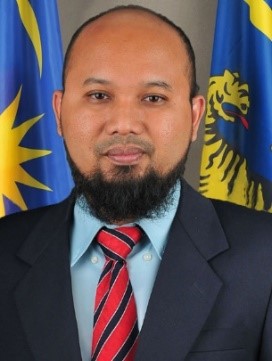
Speech Title: Research in Power Systems Towards Achieving Sustainable Development Goals
Abstract: Sustainable Development Goals (SDGs) is the 2030 core agenda in sustainable development which was agreed by the world leaders on September 25, 2015, at the United Nations Conference. With 17 goals, 169 targets, and 247 global indicators, it’s a global commitment towards achieving stability in three dimensions of sustainable development (social, economy, and environment). In order to achive these goals, intensive research and development in various area are important aspects to be considered. Electrical power system is potential area that can be improved to contribute in SDGs. Goal 7 on Affordable and Clean Energy and Goal 13 on Climate Action are two goals that are directly related to electrical supply industry. For example, the application of renewable energy as source of electricity able to minimise the CO2 polution and provide electrification at rural and remote area. However, such application posses some technical challenges on the stability of existing system. Furthermore, climate changes also posses some treat to the operation of power system in supplying realible electricity. Therefore, research in making the power system flexible and adaptive with such changes are important to be conducted. This talk will present the role of power system in achieving SDGs through the application of renewable energies and making it resilience against catastrophic events. Example of conducted and potential research area in making resilience electricity supply system will also be discussed in this talk.
Experience: Hazlie Mokhlis is a Professor in Power & Energy Systems. He is actively involved in research as a principal investigator with a total amount of research grant worth more than RM 2.5 million. He is the author and co-author of more than 300 publications in international journals and proceedings. Up to now, he had successfully supervised 33 PhD and more than 60 Master Studenst. He is also active as reviewer for many reputable journals and several international conferences in the area of power and energy system. His outstanding research had been recognized by Stanford University in 2020 and 2021 as one of the top 2% scientists in the world. In 2021 he was awarded Top Research Scientist Malaysia by Academic Science Malaysia. Besides research, he is also active in the development of Malaysian Standard as a member of Working Group in Development of Malaysian's Power System Analysis and Studies (WG6) and Expert Representative in IEC for project TC 8/PT 62786. Prof Hazlie is a Chartered Engineer with the Engineering Council UK and a Professional Engineer with the Board of Engineers Malaysia. He is also an external examiner/assessor for many local universities for the Electrical Engineering programme. Currently, he is chairman of IEEE Power Energy Society, Malaysia Chapter for 2020-2022 and Associate Editor for IEEE Access journal. His research is focusing on improving the efficiency and resiliency of power system operation.
Associate Professor, Muhyiddine Jradi
Center for Energy Informatics, University of Southern Denmark
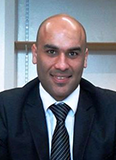
Speech Title: Auditing and Smartness Evaluation of Building Automation and Control Systems
Abstract: In future smart communities, buildings must possess energy efficient systems, provide absolute comfort, empower occupants with information, adapt operations to energy grid situations and facilitate strategic maintenance. A key condition to realize these deliverables, is a proper designed and well-equipped building automation and control system (BACS). This talk presents an innovative holistic tool ‘IBACSA’, for BACS assessment and smartness evaluation using a hybrid qualitative-quantitative multi-criteria approach. The tool serves as a comprehensive and user-friendly instrument in a systematic building initial and retro commissioning platform, ensuring a good start-up for newly built and retrofitted energy efficient buildings. First, the talk will highlight the importance of building commissioning and BACS auditing in improving the overall building stock operation and meeting environmental and energy goals. Then, IBACSA design and development will be presented, followed by live demonstration, considering three hospital buildings in Denmark.
Experience: Muhyiddine Jradi, PhD, is an Associate Professor in Energy Engineering and the leader of the Building Energy Applications Group at the Center of Energy Informatics at the University of Southern Denmark. He has a mechanical engineering background and received his PhD degree in Sustainable Building and Energy Technologies from the University of Nottingham, in 2014. Dr Jradi’s main research interests include energy efficient systems, building energy modelling and simulation, energy renovation, multi-generation systems, energy systems numerical modelling and simulation, renewable energy and energy storage. Dr Jradi is currently leading and taking part in multiple international research projects in collaboration with industrial partners and public parities with funding exceeding 4 million USD. In addition, he is serving as a member of multiple journal editorial boards and international conferences’ scientific committees. He has received multiple awards including the Dean of Engineering Research Scholarship for International Excellence from the University of Nottingham and the Sakkal Renewable Energy Award from the American University of Beirut. Dr Jradi research work has led to more than 140 academic publications in leading journals and international conferences.
Prof. Chong Kok Keong
Universiti Tunku Abdul Rahman, Malaysia
Fellow of Academy of Science Malaysia, Fellow of ASEAN Academy of Engineering & Technology (AAET)
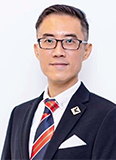
Speech Title: A novel dense-array concentrator photovoltaic system for converting solar energy into electricity and hot water
Abstract: In this presentation, we report on operational performance of dense-array concentrator photovoltaic prototype. The newly proposed system consists of primary concentrator in the form of non-imaging dish concentrator and secondary concentrator as an array of dielectric filled crossed compound parabolic concentrator. Optical and electrical simulations have been carried out to analyze the overall performance of the prototype for difference rim angles and tracking accuracies. A special method has been developed to plot the I-V and P-V curves of the prototype on-site without using commercial I-V tracer. The average cell efficiencies for all basic modules in the DACPV receiver were measured onsite in the range from 35.0% to 36.1%, which is very close to the laboratory test result conducted by Spectrolab at 38.5%. On the other hand, the system efficiency of our prototype system was measured only in the range between 16.1% and 17.4% at DNI ranging from 740 to 801 W/m2. For economical analysis, the cost per watt of current prototype has been determined as USD 5.8/W based on the price of only building one unit. The system performance can be further improved in the future by reducing the optical losses incurred by the secondary concentrator.
Experience: Prof. Dr. Chong Kok-Keong received B.Sc. (Hons) 1st class degree from University of Malaya in 1998 and Ph.D. (Optical Engineering) degree from Universiti Teknologi Malaysia in 2002. He is also Fulbright visiting scholar in Princeton University, USA for the period of Sep-Dec 2015. Currently, he is full professor in Universiti Tunku Abdul Rahman and a chartered engineer registered under the engineering council, United Kingdom. For research experience, he has been working in the field of solar energy engineering for more than 20 years and his research interest including concentrating solar power, concentrator photovoltaic system, photovoltaic, daylighting and solar thermal system. For research leadership, he has been principal investigator for seven external grants with total amount of more than USD 1 Million and leading multi-disciplinary research fund. For recognition of his contribution, Dr Chong has been honoured to receive Top Research Scientists Malaysia (TRSM) 2018, Malaysia Toray Science Foundation (MTSF) Science & Technology Award 2017, JCI Ten Young Outstanding Malaysian (TOYM) Award 2013, Fulbright Scholar Award 2015-16, Gold Award in PECIPTA’17, as well as UTAR Research Excellence Award 2010 and UTAR Innovation Excellence Award 2012 & 2014. To honour his contribution in academics & research, he has been elected as Fellow of Academy of Science Malaysia 2019, Fellow of ASEAN Academy of Engineering & Technology (AAET) 2018, Associate Fellow of AAET 2013, Global Young Academy 2014, Young Affiliate Fellow for The World Academy of Sciences (TWAS) 2011, Young Scientist Network-Academy of Science Malaysia 2012. In addition, he was invited to showcase research product in main exhibition hall of Malaysia Pavilion – World Expo 2017 Astana with theme “Future Energy”, which is the largest exhibition in the world. For the community services, he is appointed as sub-group leader of Working Group on Solar Photovoltaic System (WG/E/8-1), SIRIM, and Accreditation Committee Member of Malaysian Qualification Agency (MQA).
Prof. Rajan Jose
Universiti Malaysia Pahang 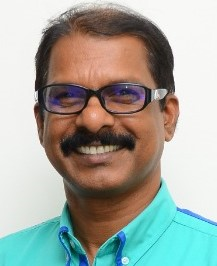
Speech Title: Electrospun Flexible Energy Devices
Abstract: Smart textiles are a convenient platform to deploy electromechanical systems and internet of things (IoT); thereby making the textile electronics as a fast-growing industry with a predicted global market of US$ 9.3 billion by 2024. The smart textiles integrate the state-of-the-art electronic gadgets such as sensors, actuators, controllers, displays, and others in consumer clothing; and powering these gadgets is a critical issue. One of the most viable approaches to power the smart textiles electronics is to develop energizers (solar cells, piezoelectric cells, batteries and supercapacitors) into the fundamental constituent of the cloth, for example, fibers (or synonymously yarns) as energy conversion and storage system. This lecture will focus on the current state of flexible energy devices developed by electrospinning, both in the lecturer’s laboratory and elsewhere, and foreseeable initiatives required to leverage the laboratory developments to the commercial sector. Of particular interest will be supercapacitors, perovskite solar yarns, and piezoelectric yarns.
Experience: Professor
Rajan Jose supervises the Nanostructured Renewable Energy Materials Laboratory
in the Universiti Malaysia Pahang (UMP) and is the Associate Editor-in-Chief of
the Springer Nature journal “Materials Circular Economy”
(https://www.springer.com/journal/42824?IFA). He has served as the Dean of
Research of UMP during Feb 2016 – Aug 2019 and a member of various committees
of UMP and Ministry of Higher Education, Malaysia. He has published over 220
papers in Web of Science (Thomson Reuters) indexed journals which are cited
nearly 11600 times with an h-index of 56 according to Google Scholar database.
Past Keynote Speakers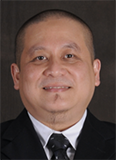
Prof. Nazri bin Ali
Universiti Teknologi Malaysia
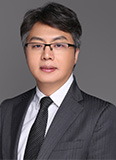
Prof. Jian-Guo Dai
The Hong Kong Polytechnic University
Assoc. Prof. Hazem Samih mohamed
Southwest Petroleum University
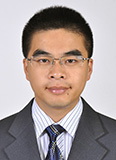
Prof. Shijian Lu
China University of Petroleum(East China), China